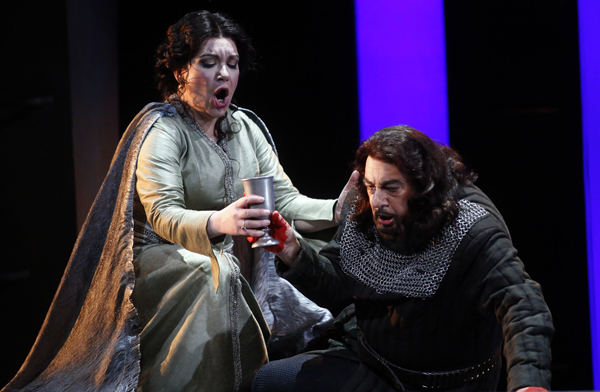Your cart is currently empty!
RETROSPECT: Macbeth

Macbeth is the story of a villain who people understand and have pity for—when the story is told correctly. Both Macbeth and his wife have the difficult task of being evil and asking for our sympathy. They are tortured souls not because they are losing the battle but because the battle is inside them, and it is up to the staging to capture this. The king feels no guilt, just the frustration and pain of a trapped animal that does not understand the very human source of Banquo’s honor. His solution is to believe a false prophecy that puts him on the wrong path, fills him with anxiety and destroys his wife. Lady Macbeth does feel guilt, and knowing she is wrong, she kills herself. We understand the lady deserves death, which only makes Macbeth’s struggle more heartbreaking as things get worse. Plácido Domingo’s voice in the LA Opera’s rendition of Macbeth is not something one can hate, so we need to find the villany elsewhere.
The witches are portrayed by an acrobatic female ballet and a moaning mob of women on an overhead balcony, but they lack the intensity of the three witches, who we know have the power of telling the inescapable future. They, like the Macbeths, are not evil. They can foresee evil and are powerless to change its future. Because of this setup our heart goes out to Macbeth—even though he is murderous—and to his wife, who out of love for him, leads him to choose the path of darkness.

The opera is not about greed but about our inability to prevent evil. Macbeth is not a villain you hate; he must be a villain who breaks your heart, making the wrong choices because they look good—he is weak but not evil. He knows the difference between right and wrong, but only after he has done the deed.
Domingo’s voice is that of a hero and of a lover that can break your heart, and in this staging we are so aware of evil—it is literally climbing the walls in every scene—that we do not understand why he cannot see it. Better to start in the light and fall into darkness and become trapped, even though you know it is wrong. Better to give Macbeth a path, i.e. make the first death easier because Banquo looks old and sick, or because he has a son who inspires jealousy. Once the path is taken, an obstinate Macbeth refuses to admit he is wrong and to give it up even after his wife goes mad. Perhaps he could physically try to shake some sense into her, since we cannot add dialogue.
As he has trapped himself into believing an impossible prophesy, we mourn for him, but the unchanging set decor, ballet acrobatics and the turgidly mournful chorus do not emotionally enhance the maestro’s battle with his predicament. His voice is a passionate one, not a hopeless one. Everything about the opera spells doom from the very beginning, so there is nowhere to go, no path to travel. Evil has already happened. If only the ballet could start with one or two cockroaches, and save the infestation for later. It is the fall from grace that is interesting—the everlasting result is depressing.